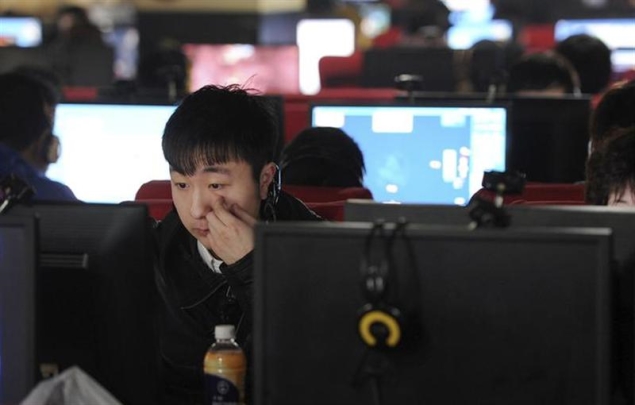- Home
- Internet
- Internet News
- China's crackdown on online rumours targeting even non dissident postings
China's crackdown on online rumours targeting even non-dissident postings

Lawyers and activists called the crackdown a significant, if crude, expansion of powers to police the Internet and a blow to those who rely on microblogs to disseminate information that is often not monitored as strictly as traditional media.
"I am really scared now that any whistleblowing might lead to an arrest," said Zhou Ze, a rights lawyer with more than 165,000 followers on the Twitter-like microblog Sina Weibo. "We all have to talk less, and more carefully."
It is common for politically sensitive posts to be taken down by censors and for users to be blocked, but recent detentions have sparked fears of harsher punishments.
At the heart of the issue is a judicial interpretation by China's top court that says bloggers can be prosecuted for posting rumours seen by more than 5,000 people, or forwarded more than 500 times.
"If rumours can lead to detention or arrest, everyone will fear for themselves and become particularly scared about criticizing officials, which we are seeing less of on the Internet," Zhou said.
An estimate of data provided to Reuters by Weiboreach, a social media data analysis firm, shows that in a random sample of 4,500 highly influential users known as "Big Vs", those with a self-reported occupation in government or academia had a much higher rate of deletion in August than those in entertainment.
The data does not differentiate between posts that users had deleted themselves and those that were deleted by authorities.
Moving target
Analysts said the judicial interpretation specifically targeted the hundreds of Big Vs - "v" for verified - who send opinions, news and information to thousands or even millions of followers. Many are entrepreneurs, celebrities or academics.
Weibo users known for political and social commentary have been detained in recent weeks, enforcing fears that rumour-mongering is not the target of the law.
Wang Gongquan, an outspoken venture capitalist, was taken away by police on Friday on charges of disturbing public order after he helped lead a campaign for the release of another activist.
Well-known whistleblower Wu Dong, more commonly recognised by his online handle "Boss Hua", was taken into police custody in Beijing, the official Liberation Daily reported on its verified Weibo feed.
He said via Weibo on Wednesday that he had been released. His phone was off and he could not be reached for comment.
Wu, a watch lover, is one of many Weibo users who post about official corruption. He drew attention last year when he posted photos of expensive watches worn by government officials last year, helping to bring down one high-flying official.
Chinese-American venture capitalist Charles Xue was detained on charges of prostitution and appeared on state TV in handcuffs on Sunday to apologise, saying his status as a Big V had gone to his head.
"Freedom of speech cannot override the law," said Xue, who was known for outspoken comments on political and social issues online.
Spreading rumours is common on Weibo, and there is little protection against defamation.
"It's important that those who spread slander are held legally responsible," said Peng Jian, a lawyer with more than 100,000 followers on Weibo. "But if it's not implemented properly, it could suppress freedom of expression."
Opinions "shouldn't be suppressed"
"The goal is pretty obvious, and it's certainly not to suppress so-called rumours. In some sense that's just an excuse," said rights lawyer Mo Shaoping. "Most of the things people post on the Internet are just opinions and views. Those things shouldn't be suppressed."
Mo said he had stopped using Weibo two years ago under pressure from officials.
Legal experts said that the court's interpretation amounted to a broadening of authority to police the Internet, as if Weibo were a physical public space.
"It's a significant expansion because it criminalizes postings that were not criminalized before, and not only rumours and libellous comments," said Nicholas Bequelin, of New York-based Human Rights Watch.
Tong Zhiwei, a professor at East China University of Political Science and Law who has about 95,000 Weibo followers, said he had seen a rise in the number of his posts that had been censored in recent weeks.
"It's not so much the judicial interpretation per se that is affecting my comments," said Tong, who frequently comments on social issues from a legal perspective. "It's the atmosphere it has created."
Criticising one-party rule was in effect forbidden already, Bequelin added.
"Nine tenths of the Internet population would be in prison if you were to apply this very strictly," Bequelin said. "But that is the root of China's regulation of freedom of expression."
The latest crackdown was also significant because it targeted Internet users who didn't see themselves as dissidents, said Sarah Cook of Freedom House, a U.S.-based group promoting political freedom and human rights.
"Now you're having a criminal judicial interpretation and then actual arrests of people who don't see themselves as political," Cook said. "The group of people being targeted is much wider."© Thomson Reuters 2013
Get your daily dose of tech news, reviews, and insights, in under 80 characters on Gadgets 360 Turbo. Connect with fellow tech lovers on our Forum. Follow us on X, Facebook, WhatsApp, Threads and Google News for instant updates. Catch all the action on our YouTube channel.
Related Stories
- Samsung Galaxy Unpacked 2026
- iPhone 17 Pro Max
- ChatGPT
- iOS 26
- Laptop Under 50000
- Smartwatch Under 10000
- Apple Vision Pro
- Oneplus 12
- OnePlus Nord CE 3 Lite 5G
- iPhone 13
- Xiaomi 14 Pro
- Oppo Find N3
- Tecno Spark Go (2023)
- Realme V30
- Best Phones Under 25000
- Samsung Galaxy S24 Series
- Cryptocurrency
- iQoo 12
- Samsung Galaxy S24 Ultra
- Giottus
- Samsung Galaxy Z Flip 5
- Apple 'Scary Fast'
- Housefull 5
- GoPro Hero 12 Black Review
- Invincible Season 2
- JioGlass
- HD Ready TV
- Latest Mobile Phones
- Compare Phones
- Tecno Pova Curve 2 5G
- Lava Yuva Star 3
- Honor X6d
- OPPO K14x 5G
- Samsung Galaxy F70e 5G
- iQOO 15 Ultra
- OPPO A6v 5G
- OPPO A6i+ 5G
- Asus Vivobook 16 (M1605NAQ)
- Asus Vivobook 15 (2026)
- Brave Ark 2-in-1
- Black Shark Gaming Tablet
- boAt Chrome Iris
- HMD Watch P1
- Haier H5E Series
- Acerpure Nitro Z Series 100-inch QLED TV
- Asus ROG Ally
- Nintendo Switch Lite
- Haier 1.6 Ton 5 Star Inverter Split AC (HSU19G-MZAID5BN-INV)
- Haier 1.6 Ton 5 Star Inverter Split AC (HSU19G-MZAIM5BN-INV)






![[Partner Content] OPPO Reno15 Series: AI Portrait Camera, Popout and First Compact Reno](https://www.gadgets360.com/static/mobile/images/spacer.png)









